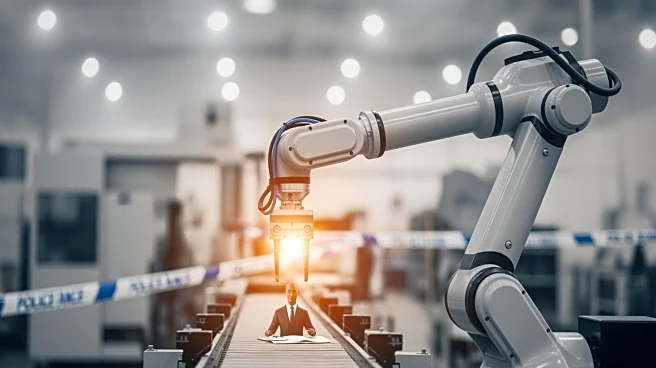What's Happening?
The integration of artificial intelligence (AI) into various sectors has led to significant job losses, as reported by individuals who have experienced these changes firsthand. Workers from diverse fields,
including copywriting, 3D modeling, and insurance, have shared their experiences of being replaced or pushed out by AI technologies. A former copywriter noted that AI tools have taken over tasks such as writing ad copy and web pages, leading to job displacement. Similarly, a 3D modeler with two decades of experience reported that AI's ability to generate final images and videos has made traditional 3D modeling less necessary, resulting in a career shift to retail. In the insurance industry, AI has been used to automate policy generation and claims processing, leading to layoffs and increased workloads for remaining employees. The fraud department of a major insurance carrier, for instance, began using AI to identify fraud indicators, which led to the dismissal of experienced staff and reliance on AI-driven processes.
Why It's Important?
The widespread adoption of AI in various industries highlights a significant shift in the labor market, with automation replacing human roles in tasks that were once considered secure. This transition poses challenges for workers who must adapt to new technologies or face unemployment. The impact is particularly pronounced in sectors where AI can efficiently perform repetitive or data-driven tasks, such as insurance and content creation. The displacement of experienced workers not only affects individual livelihoods but also raises concerns about the loss of institutional knowledge and expertise. Companies may face legal and operational challenges as AI systems, while efficient, can make errors that experienced human workers might avoid. This shift underscores the need for policies and strategies to support workers transitioning to new roles and to ensure that AI integration is managed responsibly.
What's Next?
As AI continues to evolve, industries are likely to see further integration of these technologies, potentially leading to more job displacement. Companies may need to invest in retraining programs to help employees adapt to new roles that complement AI systems. Additionally, there may be increased scrutiny and regulation of AI applications to ensure ethical use and to mitigate potential legal issues arising from errors in AI-driven processes. Stakeholders, including policymakers, businesses, and labor organizations, will need to collaborate to address the economic and social implications of AI-driven job displacement.
Beyond the Headlines
The ethical implications of AI-driven job displacement are significant, as they raise questions about the responsibility of companies to their employees and the broader societal impact of automation. The potential for AI to exacerbate economic inequality is a concern, as those without access to retraining or new opportunities may be disproportionately affected. Furthermore, the reliance on AI in critical sectors like insurance could lead to systemic risks if AI systems fail to perform as expected. These developments call for a balanced approach to AI integration, ensuring that technological advancements benefit society as a whole.










